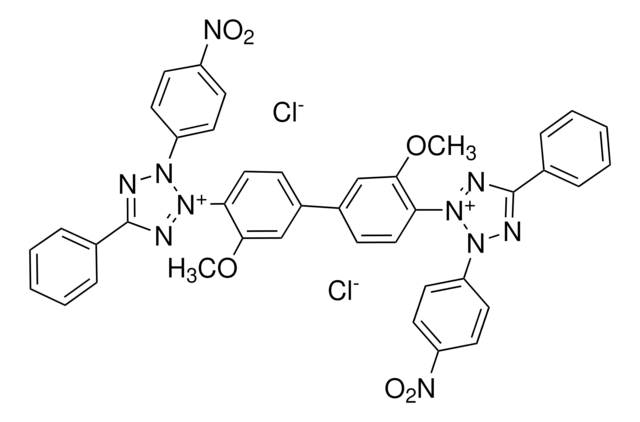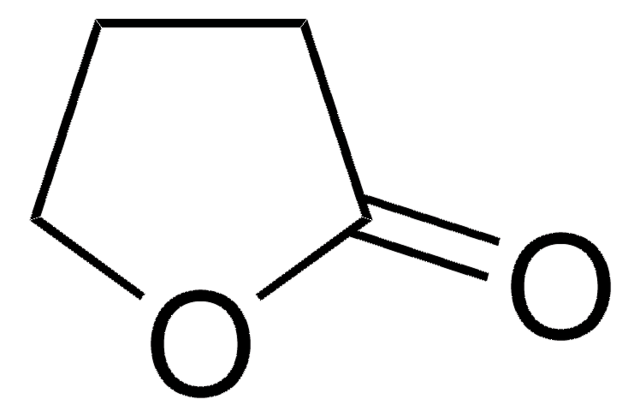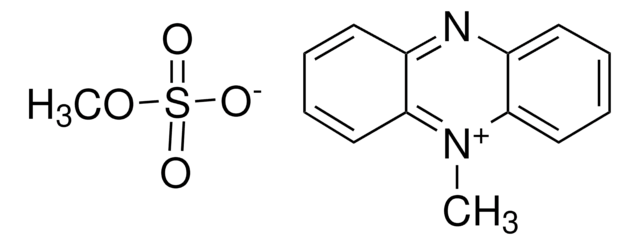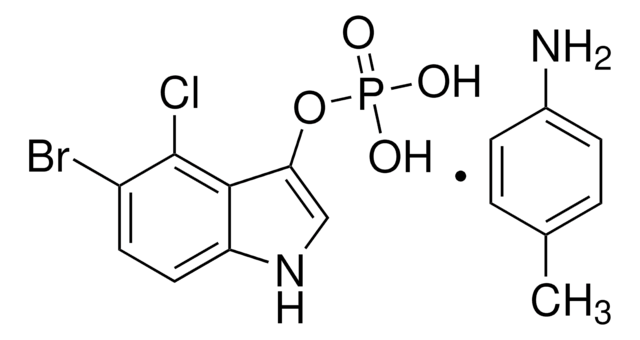93862
Nitrotetrazolium Blue chloride
90.0-110.0% (calc. on dry substance, T), powder
Synonym(s):
2,2′-bis(4-Nitrophenyl)-5,5′-diphenyl-3,3′-(3,3′-dimethoxy-4,4′-diphenylene)ditetrazolium chloride, 3,3′-(3,3′-Dimethoxy-4,4′-biphenylene)bis[2-(4-nitrophenyl)-5-phenyl-2H-tetrazolium chloride], p-Nitro-Blue tetrazolium chloride, p-Nitrotetrazolium blue, NBT, Nitro BT
About This Item
Recommended Products
Product Name
Nitrotetrazolium Blue chloride, 90.0-110.0% (calc. on dry substance, T)
Quality Level
Assay
90.0-110.0% (calc. on dry substance, T)
form
powder
impurities
≤10% solvent content
≤10% water
λ
in methanol
UV absorption
λ: 252-262 nm Amax
storage temp.
2-8°C
SMILES string
[Cl-].[Cl-].COc1cc(ccc1-[n+]2nc(nn2-c3ccc(cc3)[N+]([O-])=O)-c4ccccc4)-c5ccc(c(OC)c5)-[n+]6nc(nn6-c7ccc(cc7)[N+]([O-])=O)-c8ccccc8
InChI
1S/C40H30N10O6.2ClH/c1-55-37-25-29(13-23-35(37)47-43-39(27-9-5-3-6-10-27)41-45(47)31-15-19-33(20-16-31)49(51)52)30-14-24-36(38(26-30)56-2)48-44-40(28-11-7-4-8-12-28)42-46(48)32-17-21-34(22-18-32)50(53)54;;/h3-26H,1-2H3;2*1H/q+2;;/p-2
InChI key
FSVCQIDHPKZJSO-UHFFFAOYSA-L
Looking for similar products? Visit Product Comparison Guide
Biochem/physiol Actions
Analysis Note
250 mg in 5 mL methanol: yellow to very dark yellow and light brown-yellow to very dark brown-yellow
Signal Word
Warning
Hazard Statements
Precautionary Statements
Hazard Classifications
Acute Tox. 4 Oral - Eye Irrit. 2 - Skin Irrit. 2 - STOT SE 3
Target Organs
Respiratory system
Storage Class Code
11 - Combustible Solids
WGK
WGK 3
Flash Point(F)
Not applicable
Flash Point(C)
Not applicable
Regulatory Listings
Regulatory Listings are mainly provided for chemical products. Only limited information can be provided here for non-chemical products. No entry means none of the components are listed. It is the user’s obligation to ensure the safe and legal use of the product.
FSL
Group 5: Self-reactive substances
Nitro compounds
Hazardous rank II
2nd self-reactive materials
JAN Code
93862-2.5G:
93862-100MG:
93862-500MG:
93862-BULK:
93862-VAR:
Choose from one of the most recent versions:
Already Own This Product?
Find documentation for the products that you have recently purchased in the Document Library.
Customers Also Viewed
Our team of scientists has experience in all areas of research including Life Science, Material Science, Chemical Synthesis, Chromatography, Analytical and many others.
Contact Technical Service









